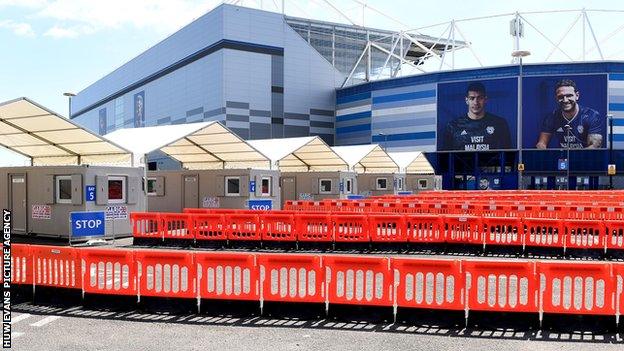Coronavirus: Cardiff and Swansea's strange new order in Championship
- Published

Cardiff City Stadium has been used as a coronavirus testing centre during the pandemic
The absence of fans won't be the only difference Cardiff City and Swansea City players will notice when Championship football returns.
A traffic light security system, some club players and staff using different dressing rooms, no handshakes - and even travelling on more than one bus for away games.
All these conditions - and plenty more - could represent the new normal as the race for the Premier League returns.
"Loads of things have to be encountered and digested before the first game," says Cardiff manager Neil Harris.
Swansea are back in action at Middlesbrough on 20 June, with Cardiff home to Championship leaders Leeds United at noon the following day.
For Swansea, the first hurdle is the actual travel.
With social distancing, will players and officials be able to sit on the same bus? Or will they need two team coaches?
Harris asks: "How many players can you have on a coach? How far is it realistic to ask a player to drive a car to a game such as Bristol City [who Cardiff visit on Saturday, 4 July].''
Clearly a hotel will be required for what is Swansea's longest journey of the season. But will all individuals have to be in single rooms, rather than sharing with regular room-mates?
Some clubs may also be keen to take their own caterers for food provision.
However sides travel to games, the stadiums will look and feel a lot different - and not just because noisy fans will not be in attendance to create hostile atmospheres.
It is understood clubs will operate a traffic light system in order to limit access to certain areas.
The red zone will be strictly for players, backroom staff and officials of the clubs and will include the technical areas alongside the pitch.
The amber zone will basically be the bowl of the stadium, though again strictly controlled.
And the green zone will effectively be outside of the stadium, principally car parks.
It is possible more areas than the two dressing rooms will be used for players to prepare for an encounter.
The varying size of dressing rooms at different venues could mean starting players and substitutes changing separately. There could be a third changing room for the array of medical and backroom staff.
When the teams walk onto the pitch, they will only see a maximum of 10 directors from either club in the executive seats, along with six scouts - one from each of the next three opponents for both clubs.

Swansea's Bersant Celina (left) and Cardiff's Marlon Pack in action in the south Wales derby, in January, which ended goalless
The two teams will walk out in separate lines and there will be no handshakes before kick-off. The referee and his team will also enter separately.
It will all add up to a totally different experience to anything the professionals will have experienced as they face nine regular league games, while aiming for a place in the play-off semi-finals, with the final due on the first weekend in August.
After strict guidelines for training and preparation, Swansea head coach Steve Cooper is philosophical about another hurdle to overcome to get the show back on the road.
He says: "Middlesbrough is our furthest away game, so that's great timing!
"When it comes, we will deal with it head on and make the best of it. If it means getting a game of football on we will do anything.
"We will make the best of however it is and the logistics around it and be in the best place possible to go and play the game."
Cardiff's Harris says: "The people behind the scenes at the club have done an unbelievable job in gaining the information and knowledge we need to continue in a safe environment.
"I have full faith in them to know we will be ready.''
An EFL spokesman pointed out the players are being tested twice a week.
He also said the EFL would continue to be in communication with the clubs with information to ensure the protocols, which had been developed in line with government guidance, are followed.